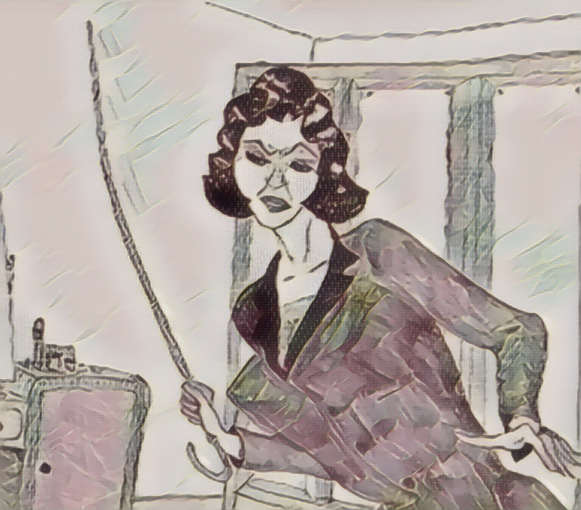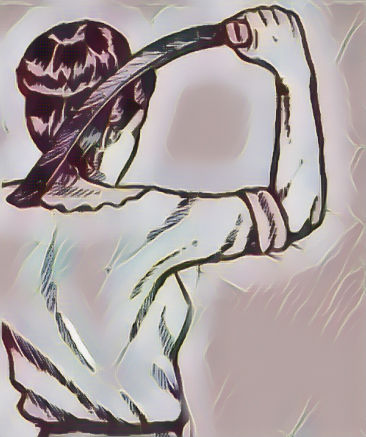(gap: 2s) My mother was the undisputed authority in our home, especially during those long stretches when my father was away on military service. With five children under one roof, the house was a constant whirlwind of noise, laughter, and the occasional squabble. Yet, somehow, she managed to keep us all in line, her presence as steady and unyielding as the ticking of the grandfather clock in the hallway.
She embodied the ideal of a 1950s mother—always immaculate, even when chaos reigned around her. I can still picture her in those crisp, floral-print dresses, the fabric rustling as she moved briskly from room to room. Her narrow belt cinched her waist, and her sensible shoes echoed on the wooden floors, a sound that could make us freeze mid-mischief. Her hair, always set in soft, glossy waves, framed a face that was both gentle and formidable. The string of pearls she wore seemed to catch the light with every gesture, a subtle reminder of her poise. But it was her eyes that truly commanded respect—cool, unwavering, and capable of silencing even the rowdiest of us with a single arched eyebrow. (short pause) When discipline was needed, she was methodical, almost ritualistic. Her tools were always within reach: her firm, capable hand for swift justice, a heavy wooden hairbrush for more serious infractions, and, on rare but memorable occasions, a leather strap hidden away in a drawer. She believed in clear boundaries and consequences, and we all knew the drill—bent over her knee for the hairbrush, or hands on the bed for the strap. The reasons for discipline were many: talking back, fighting, shirking chores, or sneaking out after curfew. She never shouted, but her quiet authority was enough to make our hearts pound with dread. (pause)
Most days, it was her hard hand that delivered a quick smack to our bottoms, a sharp reminder to behave. But as we grew older and more defiant, the hairbrush became her weapon of choice. Its sting was legendary in our household, and the mere sight of it could send a chill down my spine.
The brush was reserved for our worst offenses, and I dreaded it—not just for myself, but for my siblings as well. I remember the way we’d all fall silent when one of us was called into the sitting room, the rest of us listening with bated breath for the telltale sound of the brush meeting flesh. There was no satisfaction in another’s punishment; the memory of that pain was too fresh, too real. Sometimes, after a particularly harsh session, we’d huddle together in our shared bedroom, sniffling and rubbing sore bottoms, offering each other the silent comfort of shared suffering.
Growing up as an ‘Army Brat’ meant that corporal punishment was the norm, not just in our house but in the homes of our friends as well. We’d swap stories on the playground, comparing the severity of our parents’ methods. The hairbrush, though, was universally feared. And if we pushed our luck too far, the strap awaited—a punishment so severe it was spoken of in hushed tones, reserved for only the gravest of misdeeds.
Our years in Singapore during the 1950s were marked by the constant absence of my father, stationed up in Malaya. Mother ruled the household with her hairbrush, and she did not hesitate to use it when we crossed the line. I can still recall the sting, the hot tears, and the shame of being sent to bed with a throbbing bottom, the sounds of the tropical night filtering through the open windows as I tried to will myself to sleep.
Our amah, the woman who helped run our household, was a force in her own right. She was tall and broad-shouldered, her face capable of shifting from stern to tender in a heartbeat. Her hair was always pulled back in a severe bun, and her hands—large, calloused, and strong—were as skilled at scrubbing floors as they were at comforting a crying child. She moved through the house with a quiet authority, her sharp eyes missing nothing, her presence both reassuring and intimidating.
The amah managed the household with a kind of military precision, keeping us children in line while juggling endless chores. Despite her strictness, there was a warmth to her care—a way she’d sneak us extra biscuits or tuck us in at night, her voice softening as she hummed old lullabies from her homeland. Yet, when it came to discipline, she was unwavering. We respected her, but we also feared her, knowing that her patience had limits.
There were moments of levity, too. Sometimes, she’d join in our games, her laughter booming as she chased us around the garden. Other times, she’d share a conspiratorial wink when we managed to outsmart Mother, if only for a moment. But when we crossed the line, her demeanor changed instantly—her voice firm, her expectations clear. We knew better than to test her for long.
If we misbehaved while Mother was out, the amah would keep a mental tally of our offenses, ready to report every detail upon our parents’ return. The dread of waiting for that inevitable reckoning was almost worse than the punishment itself. I sometimes suspected she took a certain satisfaction in seeing us disciplined, sharing stories and laughter with the other house staff about our misadventures and the consequences that followed.
One evening stands out in my memory—a humid night when the air was thick with the scent of frangipani and the distant hum of cicadas. We’d crept out of bed after lights out, giggling as we raided the pantry for biscuits and sweet tea. Suddenly, the door swung open and there stood the amah, arms folded, her expression unreadable. She gave us a choice: either she would tell ‘Missy and Master’ about our naughtiness, or she would deal with us herself, right then and there.
The room seemed to shrink as she fixed us with her stern gaze. Her voice was low, steady, and carried the weight of absolute authority. “You know the rules,” she began, her accent crisp and her words deliberate. “Bedtime is seven o’clock. Not seven-fifteen, not when you feel like it. Seven. You break the rules, you break trust. And trust is not so easy to get back.” She paused, letting the seriousness of the situation settle over us. “You think you are clever, sneaking around, but I see everything. I hear everything. You are not little babies anymore. You know right from wrong.” (pause) Her tone softened just a fraction, but her eyes remained hard. “If I tell Missy and Master, you know what will happen. You will get the strap, and you will lose your treats for a week. Or—” she drew out the word, making us squirm—“I can deal with you now. My way. You choose. But either way, you must learn: actions have consequences.” (pause) The choice was clear, and the gravity of her words pressed down on us. We exchanged nervous glances, the thrill of our midnight adventure replaced by a cold knot of dread in our stomachs. We chose her, hoping for mercy, but knowing we deserved none.
She led my brother and me to her small, spartan room at the back of the house. The air was cool and smelled faintly of soap and starch. Without a word, she sat on her narrow bed, pulled me over her knee, and delivered a spanking that left me breathless. There was no warning, no gentle preamble—just the relentless smack of her work-hardened hand. I remember the roughness of her skirt against my skin, the coldness of the concrete floor beneath my hands, and the way my cries seemed to echo in the tiny room. I pleaded, promising never to misbehave again, but she was unmoved, her face set in grim determination.
The spanking was swift but thorough. Her hand, broad and calloused from years of hard work, landed again and again with a sharp, stinging precision. Each smack was punctuated by a stern word: “This—(smack)—is—(smack)—for—(smack)—breaking—(smack)—rules.” My brother watched, wide-eyed, as I squirmed and kicked, tears streaming down my face. When it was his turn, he tried to be brave, but the resolve melted away with the first few swats. The sound of our crying filled the small room, mingling with the steady rhythm of her discipline. (pause) When she finally let us up, we stumbled to the floor, clutching our sore bottoms, our cheeks wet with tears and burning with shame. The pain was sharp and humiliating, but it was the disappointment in her eyes that stung the most. We didn’t dare complain. We’d made our choice, and now we had to live with it.
The emotional impact lingered long after the physical pain faded. That night, as we lay in our beds, the house quiet except for the distant hum of the night, we whispered apologies to each other, vowing never to break curfew again. The lesson was seared into our memories—not just the sting of her hand, but the weight of her words, the seriousness of her lecture, and the knowledge that trust, once broken, was not easily mended.
The amah disciplined us several more times before she eventually left our family to return home. Looking back, my brother and I can laugh about those incidents, seeing them as classic lessons in “be careful what you wish for.” But at the time, those moments were seared into our memories—reminders of the complex web of authority, affection, and discipline that shaped our childhood. The house, with its echoes of laughter and tears, was a world unto itself, and every corner held a story, every shadow a lesson learned the hard way.







